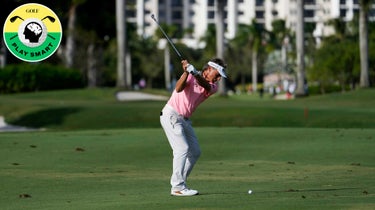
GOLF Top 100 Teacher Cameron McCormick unveils six tips for amateurs to strengthen their golf mindset like the best players in the world.
Getty Images
Most amateurs think they have a strong golf mindset. But as soon as they shank a drive or fail to execute a flop shot, they immediately lose their composure and begin to see their scores unravel.
But Cameron McCormick — a GOLF Top 100 Teacher and the swing coach for players like Jordan Spieth, So Yeon Ryu and Beau Hossler, among others — says amateur golfers have the ability to keep their cool like the pros; it just takes some repetition and simple mental exercises.
McCormick has been around some of the best golfers in the world, along with some of the top sports psychologists. So to help all the Average Joes understand the secrets to a confident golf mindset, he recently shared on Instagram a few tips that he’s learned along the way.
Take a look below to see what he suggests to remain confident despite the ups and downs that a round of golf often brings.
Stop shoulding on yourself
In McCormick’s experiences, he reminds amateurs to temper their expectations of themselves on the golf course. Sure, we all think we can hit the ball like a pro, but, in reality, it’s not going to happen.
Says McCormick, “negative affects your way more than positive, so let’s be careful what we tell ourselves, what we listen to, [and] who we allow to influence us.”
Mistake amnesia
Amateurs are going to make mistakes. Pros are going to make mistakes. The trick is to accept them, have a short memory about them, and move on to the next shot — which is the only thing any player can control after making a bad shot.
As McCormick suggests, “use your mistakes to make corrections in the moment, but then don’t continue to play looking in the rearview mirror.”
Highlight reel
Having a strong golf mindset means visualizing the shot before you take (and hopefully make) it. But it also means celebrating the shots that you have hit with success, and trying to channel that same energy for shots moving forward. This doesn’t necessarily mean recording every shot on video, but, according to McCormick, simply journaling about a positive result.
“It can be a written reel. Journal about your best shots in vivid detail and replay them in your mind.”
Big-time player = big-time play
When the pressure is at its highest, how will you respond? Sure, a pro feels that weight on their shoulders with nearly every shot. But for amateurs, it can simply be a putt to break 100 for the first time, or a fun challenge between friends on a closest to the pin. McCormick says to imagine being a junkyard dog, digging deep to come out on top.
“When you’re backed into a corner with threat (real or imagined), be a pit bull in a fight with 10 others for the last scrap of meat.”
Anger
Plenty of amateurs experience anger during a round of golf. If you let it get the best of you, it will derail your entire scorecard, and take away any joy of playing. But McCormick says anger can be used to your advantage — so long as you reimagine it.
“It’s useful as a motivator, to challenge yourself to rise up in those moments when you may have cowered away before,” McCormick says. “It can be used to challenge focus and attention to shift from catastrophizing to the shot at hand.”
Be the cork
During a round of golf, players will experience a number of different emotions. How one responds to both the negative and positive ones can make all the difference in having a strong or weak golf mindset. This will impact your score — so McCormick says players must “pop back up” when things don’t go right.
“Hit a bad shot? So what, go get it up and down,” he says. “Resiliency and grit define great athletes.”










